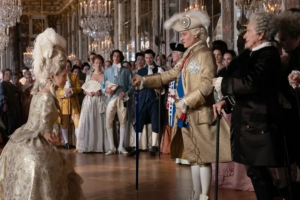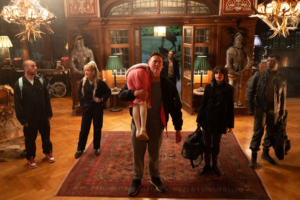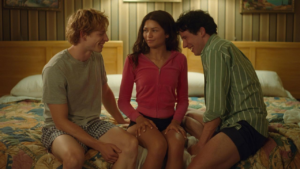Reviewed by GREG KING
Director: Pedro Almodovar
Stars: Emma Saurez, Adriana Uguarte, Blanca Pares, Rossy de Palma, Daniel Graol, Dario Grandinetti.

Pedro Almodovar’s 20th film is something of a dull affair that lacks many of the Spanish auteur’s usual flamboyant flourishes, edgy quality and stylistic signature touches. It doesn’t carry the emotional weight of his best films.
The eponymous Julieta (played by Emma Suarez, who has worked with Almodovar before) is planning to leave her beloved Madrid and its painful memories and move to Portugal with her boyfriend Lorenzo (Dario Grandinetti, another Almodovar veteran). But then she hears news of her estranged daughter Antia (Blanca Pares) who she hasn’t seen or heard from for over a decade. On the verge of a nervous breakdown and anxious to atone for the past, Julieta begins to write a detailed letter to her daughter in which she lays bare all the things that she had been unable to articulate when they were together.
A series of extended flashbacks takes us back thirty years and reveals how the younger Julieta (played by relatively unknown Spanish actress Adriana Ugarte), a teacher of Greek mythology, met Antia’s father Xoan (Daniel Graol), a ruggedly handsome fisherman. Xoan’s imposing housekeeper Marian (Rossy de Palma, another Almodovar regular who has appeared in films like the classic Women On The Verge, etc) makes her disapproval of Julieta known. Then a tragedy is the catalyst that eventually drives mother and daughter apart.
Almodovar’s films have always been female centric in their narrative, featuring strong willed but troubled women, and Julieta is no exception. This is a sombre and elusive adaptation of three interlinked short stories from the 2004 collection Runaway, written by Nobel Prize winning Canadian author Alice Munro (best known for Away From Her, which was filmed with Julie Christie). The film, originally entitled Silence after one of the three short stories, was also intended to be the director’s first English language film, but eventually he decided to film it in his native Spain.
The film has been sumptuously shot by cinematographer Jean-Claude Larrieu (Elegy, The Woman On The 6th Floor, etc), who uses a vibrant colour scheme. He also frames characters in doorways and windows to heighten that sense of isolation. Larrieu has shot the flashbacks in bright colours giving while using dull colours for those scenes set in the present day. This is a handsomely mounted production with exquisite production design from regular collaborator Antxon Gomez, costumes from Sonia Grande, and an evocative score from Almodovar’s regular composer Alberto Iglesias.
Almodovar draws solid performances from his cast, many of whom he has worked with previously. Suarez delivers a complex, nuanced but subdued performance as the bitter, near broken adult Julieta, while Ugarte brings a freshness, an optimism and an honesty to the younger incarnation. Newcomer Pares brings a fiery passion to her role as Antia.
Julieta deals with some big themes like loss, depression, grief, regret, death, forgiveness, sexuality, guilt, secrets, memory, motherhood and complex mother daughter relationships. However, Almodovar’s direction here is more restrained, and this domestic melodrama is not as engaging or as compelling as the director’s best work.
★★☆



